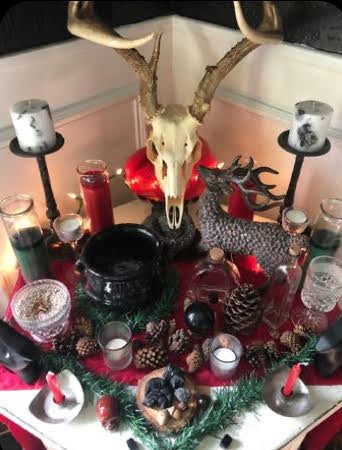Yule, or Yuletide, falls around the Winter Solstice starting on Dec. 21 all the way to Jan. 1, and lasts for 12 days. This holiday is celebrated by practitioners of witchcraft, Pagans, and spiritual seekers. It marks the Winter Solstice and the rebirth of the sun, making it a time of renewal, transformation, and connection with nature’s cycles.
While modern society has made many Yule traditions into what we now call Christmas, the Twelve Days of Yule offers a more fun way to celebrate.
What is Yule?
Yule originates from the Norse and Germanic Pagans, who celebrated the return of the sun and longer days. Traditionally, it can last for three days; however, people like to lengthen the three-day celebration to twelve days, so there’s more room to celebrate. From honoring deities to performing rituals that celebrate nature, family, and self, Yule is a period of reflection, giving thanks, and setting intentions for the New Year.
The Twelve Days of Yule
Each of the twelve days, starting from Dec. 21 to Jan. 1, have their own unique energy and focus. Here’s a few brief ideas for how each day can be honored in your own practice.
Day 1 (Mother’s Night) – December 21
Mother’s Night is on the first day of the Yule celebration. This is the night to honor all of the females you know; female deities, particularly Frigg, and Dísir, and protective female ancestors. You can light candles, bring out food offerings, write poetry, and meditate.
Day 2 – December 22
For this day, the focus is restoration. After the long night, we welcome the rebirth of the sun and reflect on cycles of life, death and rebirth. You can make sun symbols, like the sun Nordic sun wheel, or light a candle to represent this rejuvenation.
Day 3 – December 23
On the third day, you celebrate family. If you’re celebrating with your family or loved ones, gather with them for a meal. If you’re celebrating alone, focus on expressing gratitude for the relationships you cherish, both physical and spiritual; honor the people who support and strengthen you.
Day 4 – December 24
This is the Day of The Wild Hunt, a day to honor the spirits and ancestors who roam the earth, during the longest nights. It’s a good time to reflect on Odin, the Norse god often associated with Yule and the Wild Hunt. You can leave offerings like bread or apples, for spirits at your doorstep.
Day 5 – December 25
While much of the world celebrates Christmas, the fifth day of Yule celebrates community and giving. It’s a great day to reach out to friends, neighbors, or coven members (if you’re a witch), and share small gifts, food, or simply kind words.
Day 6 – December 26
The theme for day six of Yule is spiritual renewal. You can light candles in the morning to bring blessings into your home. You can also cleanse your space, altar, or tarot cards, and set your intentions for the remainder of the Yule season.
Day 7 – December 27
On this day, wisdom is pursued. People usually turn to divination, whether it’s through tarot, runes, or scrying to seek guidance for the coming year. Take time to reflect on past lessons you’ve learned and the direction you want to go in the future.
Day 8 – December 28
This day focuses on abundance and the generosity of the Universe. You can make spells for prosperity, or set your intentions for abundance in the coming year. Often, people burn incense like cinnamon or cloves to attract success and wealth.
Day 9 – December 29
The Day of Strength encourages you to honor your personal power. On this day, you can reflect on the challenges you’ve faced and overcome. You can also call on deities or spirits of strength, like Thor or the warrior spirits of your ancestry, to empower you.
Day 10 – December 30
As the Yule season is coming to a close, It’s time to honor protection. Make protective charms or talismans, smudge your home (it is a closed practice, so do this only if you are Indigenous), or cast a circle to shield your space from negativity. Focus on the positive energy you had since the start of Yule.
Day 11 – December 31
This is a night for celebration and joy. Yule merges with New Year’s Eve, so light fireworks or sparklers, dance or make noise, driving away any lingering darkness and welcome a brighter year.
Day 12 – January 1
The final day of Yule is a day of renewal and new beginnings. Reflect on the transformations you went through, during the Yule season. You can write down goals for the new year or create a vision board that represents your intentions.
Yule is a time to connect to the past, honor the present, and prepare for the new year. People take these twelve days to deepen their spiritual practice, honor the natural cycles, and invite positive energy for the year ahead.
One of the many traditions for Yule includes making a Yule log, whether it’s a cake or a real log, and decorating it with dried herbs, pinecones, and greenery.
Most people believe that all of the Pagan traditions like Yule have died, but many still celebrate it like their ancestors did before them.










Artis Mooney • Dec 26, 2024 at 9:40 am
Thank you for this! I was doing a quick google search, this came up, I really resonated with it, and then I see that you are a student (or associated with a high school)! I love it! This was much better written and more helpful to me than any of the other things that popped up on the first couple pages of Google search, so just letting you know!
MAK • Dec 24, 2024 at 9:58 pm
Long may our connections to our past give us strength, and our true relationships shows us how to live in the present.
Helen Hastings • Dec 21, 2024 at 7:26 am
Lovely piece! I have felt a little unmoored this year and this article gives me ideas on how to stay grounded. Thank you.
Jenny Leigh Tolar • Dec 21, 2024 at 1:32 am
Happy Yule!